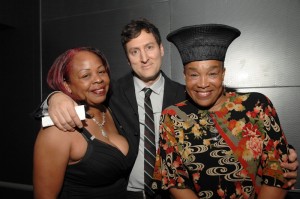Machtinger said the key to curbing this epidemic is to address the trauma, not just the illness. "Our hope is that screening for trauma and intervening for trauma becomes a required aspect of the care for all women with HIV, along with blood tests and HIV medication adherence."
Machtinger says the Women's HIV Program (WHP) has turned to an innovative approach to intervention--theater. In a unique collaboration between the WHP and the San Francisco group Cultural Odyssey, HIV-positive women go through a year-long workshop. At the end of the year, the women disclose their HIV status publicly in a performance called Dancing with the Clown of Love.
"None were completely out about their diagnosis prior to participating, and now all of them are out publicly - to their families, and friends and entire community," said Machtinger. "The women who participated described it as transformative."
Cassandra Steptoe is one of those women. Steptoe was diagnosed with HIV in 1987, a time when she was working as a prostitute to support her own heroin and cocaine addictions, as well as her then-husband's addiction. She didn't reveal that she was HIV-positive for almost two decades. Steptoe says she was frequently beaten, both by her husband and her clients.
"At that point I felt that my life was useless," said Steptoe. "I didn’t have no hope. Because 1987, when I was diagnosed, there was a lot of people dying in the circle of men and women that I would hang around with. They was dying. And so I just waited around, wanting to die and wondering when I was gonna die. But in the process I was still shooting dope, I was still selling my body, I didn’t care about life, period. I lived in a dark world."
Steptoe lived on the streets for much of the next two decades. Then in 2001 she was sent to a drug treatment center in San Francisco. That's where she met Machtinger, and was introduced to the HIV-positive women's theater workshop. In the workshop, HIV-positive women like Steptoe write and perform their traumatic personal stories, under the guidance of Cultural Odyssey's Rhodessa Jones.
"Rodessa has a way of having us write our feelings about our past out -- the dark places that we wouldn’t go into and we wouldn’t talk about," Steptoe said. "But because of the safety and trust in this group, I was able to go deeper into my past and write about some things that I didn’t tell nobody. And that freed me a lot about my past."
Steptoe did her first series of live performances in 2010. She said she now takes all her antiretroviral medications, and works with other HIV-positive women in the community to overcome the shame associated with the virus. "There’s no reason to feel shame. It’s not a crime to be HIV-positive--it’s a health condition. And you know what? We not alone. We in this together. Let’s have safe sex. We don’t need to keep spreading it. Let’s be open about this."
Watch Cassandra Steptoe's performance about her HIV status.
